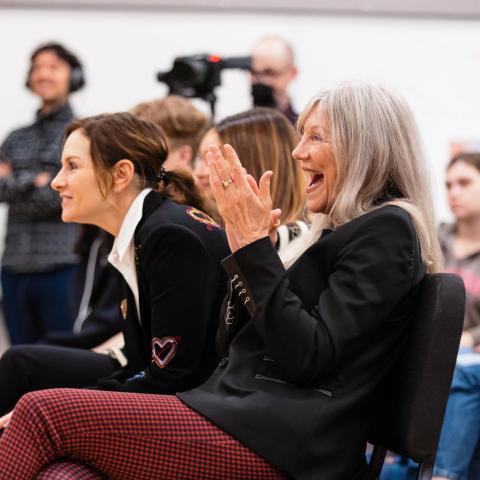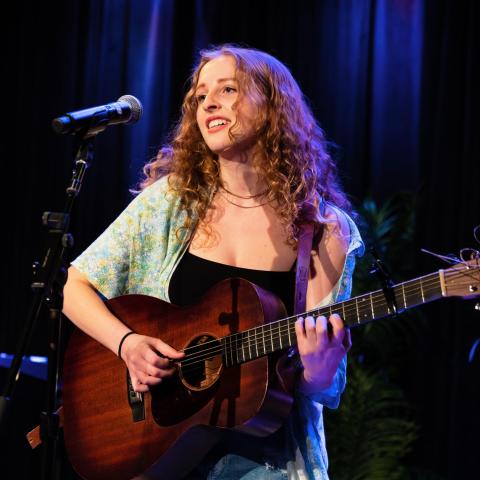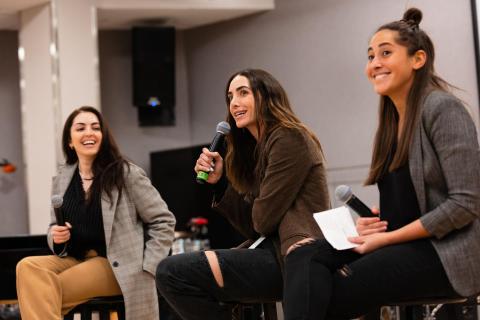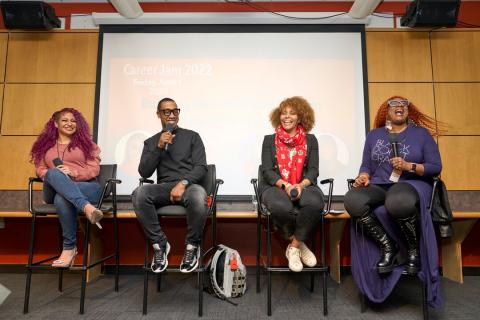Music Execs Meet the Industry’s Future at Career Jam

Vocalists Breanna Dickerson (left) and Nia Ashleigh Harris, with Julian Wilson (keys), Yves Delice (bass), Marvin Mumford II (drums), and Kyle Brady (guitar), perform at the Career Jam Original Music Showcase at Cafe 939.
Image by Elizabeth Friar
Music industry leaders from all over the country gathered at Berklee this month for Career Jam, an annual professional development event connecting students with accomplished artists, producers, record label executives, and social media creatives. These industry pros shared stories from their careers and offered practical advice for students preparing to take the first step on their own professional path. The event also gave students the opportunity to perform for talent scouts from major labels and publishing houses through one-on-one song screenings and an original music showcase.
Students could also gain an insider's view of rap music during panel discussions featuring hip-hop pioneer Marley Marl and Grammy-nominated artist Rapsody, who discussed their career trajectories from Marl’s early days with Eric B. & Rakim to Rapsody’s acclaimed 2019 album, Eve.

Bonnie Hayes, chair of the Songwriting Department, reacts to a surprise musical tribute from her students as Berklee visiting scholar Kara DioGuardi looks on.
Berklee alumni played a prominent role in the day’s events. Mike Cassidy ’97, a vice president at the rocket engineering company Astra, and Albhy Galuten ’68, a Grammy-winning producer and tech executive, discussed the creative links between music and entrepreneurship; while Pinar Toprak B.M. ’00 unpacked her experience writing the score for the hit movie Captain Marvel. Claude Kelly B.M. ’02 was featured with his cowriter Chuck Harmony and R&B legend Daryl Simmons in a discussion titled Creating Hit Songs as a Songwriter/Producer.
Career Jam also was a fitting occasion to honor two beloved faculty members who will be retiring from Berklee at the end of the academic year. The Dorenfeld Fellowship Award was dedicated to Jeff Dorenfeld, professor of music business, in recognition of his 26 years of service. This $250,000 fellowship was made possible by donor Ann Kreis, a Berklee trustee emeritus, and will be used to help students pay for living expenses while completing music business internships. Bonnie Hayes, chair of the Songwriting Department, has inspired and mentored countless students since joining Berklee in 2013. At the conclusion of her Career Jam panel, she was fêted with a surprise flash mob of well-wishers who sang a medley of her original songs.
Seeing A&R from All Sides
During an afternoon showcase at Cafe 939, eight student artists performed original songs for a packed audience that included visiting A&R representatives. Chosen by the talent relations ambassadors, a team of student A&R scouts, these artists represented the best of Berklee’s emerging performers and songwriters, spanning a range of genres from Latin pop to R&B to indie folk. Many of the featured artists have already released singles and are poised to break through to a wider fanbase.

Lindsay Whiteman
Singer-songwriter Lindsay Whiteman, from Long Island, New York, played two of her songs, “Like Like” and “Best Actress Winner.” While she was grateful for the attention of record labels, Whiteman said that, above all, she was excited to play for an enthusiastic crowd of fans—many of whom knew the words to her songs and sang along.
“It’s always the hope that you can make connections and network a little bit. But honestly, just putting on a good performance is always my favorite part,” she said. “I love performing, regardless of the outcome.”
The original music showcase made a strong impression on Amanda Samii ’09, senior vice president of A&R at Capitol Records, who participated in the Art of Record Label A&R panel along with executives from Motown, Mom + Pop, and Atlantic Records. Live performance is crucial to the scouting process, Samii said, because it reveals the fullest extent of an artist’s ability—and personality.
The future of the music industry does live in this room.
Amanda Samii ’09, senior vice president of A&R, Capitol Records
“I love seeing people perform live because the energy is so important,” she said. “What you see behind the eyes—what we just witnessed at Cafe 939—it was amazing to see some of those artists get up and give it their all.”
Every member of the panel stressed the primacy of live performance, despite the rise of social media platforms like TikTok and industry data analytics like Chartmetric. Although these digital tools have changed the A&R landscape in recent years, the fundamental process of discovering and launching new artists remains unchanged.
“The data and research are important, but ultimately it’s about how you read that data,” said Suzanna Slavin, senior vice president of A&R at the independent label Mom + Pop, home to Courtney Barnett and Beach Bunny. “If you exude your passion and energy to the people that you’re around, it’s going to come back. That’s why we're in this business. We want to discover the thing that’s going to make our heart sing.”

Left to right: G Rouzbehani, vice president of A&R, Motown Records; Amanda Samii ’09, senior vice president of A&R, Capitol Records; and Liza Levy, talent relations manager, Berklee
Students hoping to work in A&R should be prepared to start at the bottom and work their way diligently upwards. Patience and preparedness are essential, all four panelists agreed. They also emphasized the value of networking and encouraged music business students to get started immediately, cultivating their own roster of talented classmates.
“You’ve got to find your crew. Find an artist you believe in. Stay with that artist. Develop them,” Samii said. “Inevitably they’re here. The future of the music industry does live in this room.”
Breaking Down the Wall
The future of the industry—and the growth of the Latin music market, in particular—was a key topic of the panel Breaking Down Walls for Latin Artists, led by moderator Javier Limón, artistic director of Berklee’s Mediterranean Music Institute. The panel featured executives representing all facets of the industry, from the independent record label Rich Music (Sech, Justin Quiles) to the artist management agency Lionfish Entertainment (Rosalía, Lunay).
According to panelist Lazaro Hernandez, vice president of A&R at Warner Chappell Music, Latin music revenue is growing at a faster pace than any other sector of the music industry, driven largely by the commercial success of reggaeton artists like Daddy Yankee and J Balvin.
“Look at the data. For the sixth year in a row, we’re the fastest-growing genre, worldwide and in the U.S.,” he said. “We have 14 percent growth year over year, which is pretty huge.”
There’s a lot of space for different cultures to shine, then in the end we all shine together.
Lazaro Hernandez, vice president of A&R, Warner Chappell Music
Hernandez and other panelists hastened to add that there is much more to Latin music than reggaeton; but its popularity has helped to raise the profile of all Latin styles. This year’s Coachella festival, for example, will feature regional Mexican acts Grupo Firme and Banda MS, as well as Mexican rapper Natanael Cano. “There’s a lot of space for different cultures to shine, then in the end we all shine together, and it’s a unified musical moment,” Hernandez said.
Panelist Celeste Zendejas, vice president at SESAC, believes that 2017 was a turning point for Latin music in the U.S. That year, “Despacito” spent 16 weeks at the top of the Billboard Hot 100, proving that Spanish lyrics were not a barrier to exceptional chart performance.
“When Daddy Yankee, J Balvin, Bad Bunny, etc. came, they broke the wall entirely. I don’t think there’s a wall anymore. I think we’re on the other side of the wall,” she said.
All the panelists saw a need for Latin music to keep evolving—to push beyond the limits of today’s commercial success and expand the market for artists who might not fit listener’s preconceived notions of “Latin.” This movement needs to start with industry executives, Hernandez said.
“We all make choices with who we try to support and who we want to work with. What I think is really important is for big companies to support any new Latin artist or producer or songwriter that’s doing something a little different,” he said. “It’s part of representation, and that matters.”
More than Just Representation

Left to right: Panelists Tiffany Miranda, Cortez Bryant, and Madeline Nelson with moderator Tonya Butler, chair of the Music Business/Management Department
The value of representation was addressed head-on in the panel Building Your Own Seat at the Table: Black CEOs in Music, which featured Cortez “Tez” Bryant, co-CEO and entertainment manager at the Blueprint Group; Tiffany Miranda, president and founder of Girls Make Beats; and Madeline Nelson, CEO of Heads Music. The panelists expressed concern about the lack of Black leadership in the music business and explained how this imbalance motivated them to start their own companies. Leading on their own terms, these pioneering CEOs have created a better environment for Black artists, prompting the rest of the industry to reevaluate its relationships with people of color.
“Hip-hop is the largest genre in the world right now; it’s based on being Black, and at the top you don’t see that kind of representation,” Cortez said. “When I was managing Lil Wayne, I saw the people in A&R and on the marketing team, and I was like, ‘Who handles all the money? Who’s really controlling the bag?’ And none of those people looked like me.”
Hip-hop is the largest genre in the world right now; it’s based on being Black, and at the top you don’t see that kind of representation.
Cortez “Tez” Bryant, co-CEO, Blueprint Group
Nelson left her position as senior vice president of A&R at Sony Music in part because she was uncomfortable with the industry’s treatment of underrepresented artists. She founded Heads Music, her own full-service label and distribution company, so that she could stay true to her ideals of artist development, remaining personally involved in everything from management to coproducing.
“I sat in senior executive meetings—the only woman, only Black person—and I listened to my counterparts and those I reported to talk about artists in a way that just did not sit well with my soul, which is why I took the independent route as fast as I could,” Nelson said.
Becoming CEO is about more than just representation, panelists agreed. It’s about controlling one’s destiny—which means being self-sufficient and well-versed in every aspect of the business. “It’s very important to be multifaceted,” Miranda said. “As a CEO, I know how to do every single aspect of my business, so I don’t need to rely on anyone.”
Miranda also stressed that developing this broad base of industry knowledge—exactly what Career Jam was designed to facilitate—is no less important for young people still trying to find their way into the music industry. “You literally need to learn every aspect,” she said, “because you never know what’s gonna get you in.”



